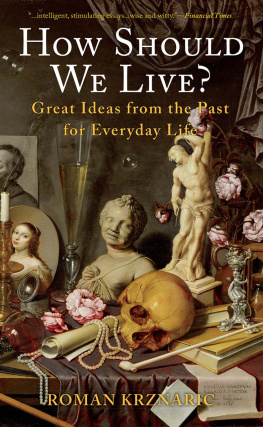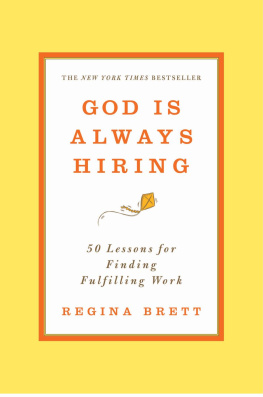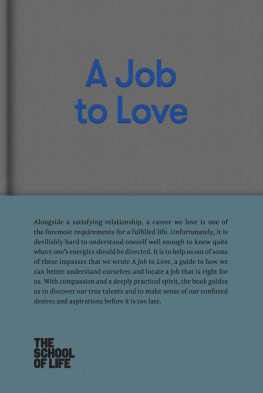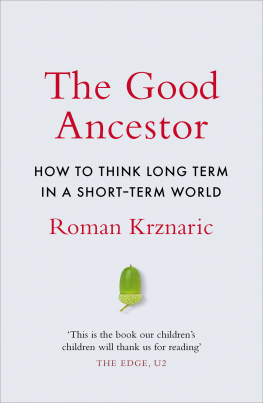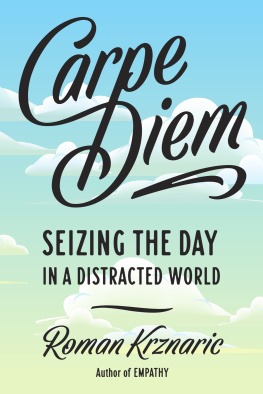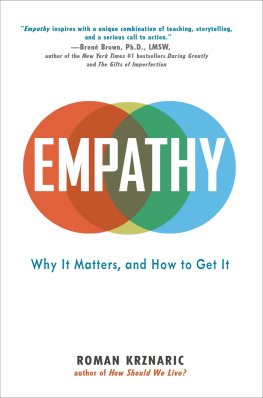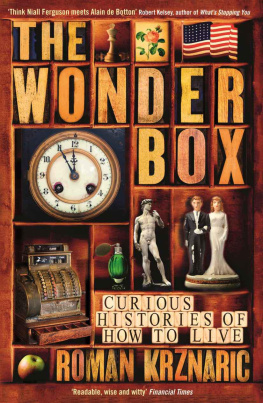
The thought once occurred to me that if one wanted to crush and destroy a man entirely, to mete out to him the most terrible punishment, one at which the most fearsome murderer would tremble, shrinking from it in advance, all one would have to do would be to make him do work that was completely and utterly devoid of usefulness and meaning.
Fyodor Dostoyevsky
1. The Age of Fulfilment
Three Career Tales
Rob Archer grew up on a housing estate in Liverpool where there was 50 per cent unemployment and the main industry was heroin. He fought his way out, studying hard and getting to university, and found a great job as a management consultant in London. He was earning plenty of money, he had interesting clients and his family was proud of him. I should have been very happy, but I was utterly miserable, he recalls. I remember being put on assignments in which I had no background but was presented as an expert. I was supposed to know about knowledge management and IT, but it all left me cold, and I always felt like an outsider. He did his best to ignore his feelings:
I assumed I should be grateful to just have a job, let alone a good one. So I focused harder on trying to fit in and when that didnt work, I lived for the weekend. I did this for ten years, burning the candle at both ends. Eventually it caught up with me. I became chronically stressed and anxious. Then one day I had to ask the CEOs personal assistant to call me an ambulance because I thought I was having a heart attack. It turned out to be a panic attack. Thats when I knew I couldnt go on.
The problem was that all the alternatives changing career, starting over again seemed impossible. How could I trade in the security of my comfortable life for uncertainty? Wouldnt I be risking all the progress I had made? I also felt guilt that I should even be searching for such luxuries as meaning and fulfilment. Would my grandfather have complained at such fortune? Life appeared to offer an awful choice: money or meaning.
At the age of sixteen, Sameera Khan decided that she wanted to become a lawyer. She was driven partly by her interest in human rights and Amnesty International, and partly by the enticing glamour of her favourite TV series, LA Law. But she also wanted to do something that would please her parents, Pakistani and East African Indian immigrants, who had arrived in Britain in the 1960s, her dad working his way up from a factory job, and both of them becoming successful social-worker managers. For them, success is measured through tangible career rungs in a profession like law, medicine or accountancy, says Sameera, who is now in her early thirties. Their expectations influenced my decision 150 per cent. She followed her plan, getting a law degree, then spending her twenties qualifying as a solicitor. She found a position as an in-house corporate lawyer for a hedge fund. I had it all, I was a City Girl earning megabucks, and loved the way law used my brain. But after five years in the job, it all suddenly changed:
I was on honeymoon, sitting on a beach in Sicily, when I had an epiphany. I realized something wasnt right. Id just got married, which was a huge rite of passage in my life and I should have been ecstatic. Id achieved my dream of becoming a lawyer, and I had my partner by my side. Yet I felt totally unfulfilled. Where were the my life is now perfect sparks? And as I sat there I worked out that the problem must be my career. I could see its future so clearly laid out before me and it filled me with dread. I realized that I wasnt going to be happy sitting behind a desk for the next forty years for the rest of my life making rich people richer. I had worked really hard to get this qualification in a respected profession, but was now left thinking, Surely my career should offer me more than this. Is this it? Is this all I get from life? When it dawned on me that my career to date felt somewhat meaningless, it was devastating.
I was really scared about contemplating anything but law. Law identified me; indeed, I thought it defined me. A lot of lawyers are like this its your label, its who you are. To lose that identity was going to make me feel naked and completely empty. If youre not a lawyer, what are you? Who are you? When I got back from my honeymoon, I could see that I was getting myself into a downward spiral of job-related despair, but I didnt know how to fix it. I literally went to Google and typed in something like What to do if you hate your career.
Iain King has never been conventional. When he left secondary school, he spent a year busking around Europe playing the guitar standing on his head. One summer while at college in the early 1990s, he and a friend crossed into northern Iraq from Turkey, where they befriended a group of Kurdish freedom fighters, travelled around with them in a Jeep full of machine guns and hand-held missile launchers, and narrowly escaped being kidnapped. Later, Iain started up a national student newspaper, which folded after half a dozen issues, then volunteered as a researcher for a political party. Never having had much of a career plan, he ended up as an expert on peace-building for the United Nations and other international organizations. He helped introduce a new currency in Kosovo and has worked alongside soldiers on the battlefront in Afghanistan. He has also found time to write a philosophy book, and to spend a year as a househusband in Syria, the lone father at baby groups in the Damascus expatriate community.
When Iains wife was pregnant with their second child, he decided it was time to give up his precarious freelance career and get a steady job back in London to support his family. He found a post in the civil service, and now advises the government on its overseas humanitarian policies. He describes it with great enthusiasm: the issues are fascinating, the people stimulating, and he is using his first-hand knowledge of conflict situations. Yet there is a lurking discomfort. Somehow being a civil servant doesnt quite fit with how he sees himself. Work and self are out of alignment:
The job is interesting but its rather conventional for the kind of person I am. I feel it isnt the permanent me. When I sit on the tube in the morning, I sometimes notice that Im wearing a suit, and Im forty, Im middle-class, Im white, Im male, and I live in one of the more conventional suburbs of London. And I think, Wheres the guy who used to stand on his head in the tube and play the guitar?
On the face of it I look like a very conventional person, yet I still regard myself as deeply unconventional. Paradox is too strong a word, but theres a tension there. At this time in my life, I have to accept the tension. Im more conventional than I might otherwise be because Ive got young kids and Im the single breadwinner. Im not about to leave my job, but I sometimes wonder, Should I really stick with this forever?
Great Expectations
The desire for fulfilling work a job that provides a deep sense of purpose, and reflects our values, passions and personality is a modern invention. Open Samuel Johnsons celebrated Dictionary, published in 1755, and you will discover that the word fulfilment does not even appear. For centuries, most inhabitants of the Western world were too busy struggling to meet their subsistence needs to worry about whether they had an exciting career that used their talents and nurtured their wellbeing. But today, the spread of material prosperity has freed our minds to expect much more from the adventure of life.
We have entered a new age of fulfilment, in which the great dream is to trade up from money to meaning. For Rob, Sameera and Iain, it is not enough to have a respectable career offering the old-fashioned benefits of a healthy salary and job security. Paying the mortgage still matters, but they need more to feed their existential hungers. And they are not the only ones. In the course of researching this book I spoke to scores of people, from over a dozen countries, about their career journeys. From stressed bankers to tired waitresses, from young graduates burdened by student loans to mothers attempting to return to the paid workforce, almost all of them aspired to have a job that was worth far more than the pay check.
Next page

